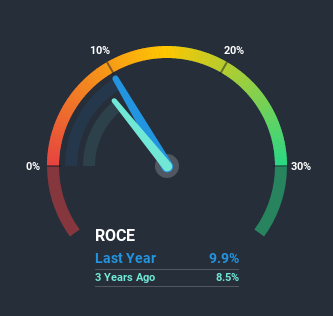Should You Be Impressed By Japan Third Party's (TYO:2488) Returns on Capital?
If you're not sure where to start when looking for the next multi-bagger, there are a few key trends you should keep an eye out for. In a perfect world, we'd like to see a company investing more capital into its business and ideally the returns earned from that capital are also increasing. Put simply, these types of businesses are compounding machines, meaning they are continually reinvesting their earnings at ever-higher rates of return. Having said that, from a first glance at Japan Third Party (TYO:2488) we aren't jumping out of our chairs at how returns are trending, but let's have a deeper look.
What is Return On Capital Employed (ROCE)?
For those who don't know, ROCE is a measure of a company's yearly pre-tax profit (its return), relative to the capital employed in the business. Analysts use this formula to calculate it for Japan Third Party:
Return on Capital Employed = Earnings Before Interest and Tax (EBIT) ÷ (Total Assets - Current Liabilities)
0.099 = JP¥295m ÷ (JP¥3.8b - JP¥810m) (Based on the trailing twelve months to September 2020).
Therefore, Japan Third Party has an ROCE of 9.9%. In absolute terms, that's a low return and it also under-performs the IT industry average of 15%.
View our latest analysis for Japan Third Party

While the past is not representative of the future, it can be helpful to know how a company has performed historically, which is why we have this chart above. If you'd like to look at how Japan Third Party has performed in the past in other metrics, you can view this free graph of past earnings, revenue and cash flow.
What Can We Tell From Japan Third Party's ROCE Trend?
When we looked at the ROCE trend at Japan Third Party, we didn't gain much confidence. Around five years ago the returns on capital were 16%, but since then they've fallen to 9.9%. Meanwhile, the business is utilizing more capital but this hasn't moved the needle much in terms of sales in the past 12 months, so this could reflect longer term investments. It's worth keeping an eye on the company's earnings from here on to see if these investments do end up contributing to the bottom line.
What We Can Learn From Japan Third Party's ROCE
To conclude, we've found that Japan Third Party is reinvesting in the business, but returns have been falling. Although the market must be expecting these trends to improve because the stock has gained 52% over the last five years. Ultimately, if the underlying trends persist, we wouldn't hold our breath on it being a multi-bagger going forward.
Like most companies, Japan Third Party does come with some risks, and we've found 3 warning signs that you should be aware of.
If you want to search for solid companies with great earnings, check out this free list of companies with good balance sheets and impressive returns on equity.
When trading Japan Third Party or any other investment, use the platform considered by many to be the Professional's Gateway to the Worlds Market, Interactive Brokers. You get the lowest-cost* trading on stocks, options, futures, forex, bonds and funds worldwide from a single integrated account. Promoted
New: Manage All Your Stock Portfolios in One Place
We've created the ultimate portfolio companion for stock investors, and it's free.
• Connect an unlimited number of Portfolios and see your total in one currency
• Be alerted to new Warning Signs or Risks via email or mobile
• Track the Fair Value of your stocks
This article by Simply Wall St is general in nature. It does not constitute a recommendation to buy or sell any stock, and does not take account of your objectives, or your financial situation. We aim to bring you long-term focused analysis driven by fundamental data. Note that our analysis may not factor in the latest price-sensitive company announcements or qualitative material. Simply Wall St has no position in any stocks mentioned.
*Interactive Brokers Rated Lowest Cost Broker by StockBrokers.com Annual Online Review 2020
Have feedback on this article? Concerned about the content? Get in touch with us directly. Alternatively, email editorial-team (at) simplywallst.com.
About TSE:2488
JTPLtd
Provides outsourced technical services to technology companies in Japan.
Low risk unattractive dividend payer.
Market Insights
Community Narratives




